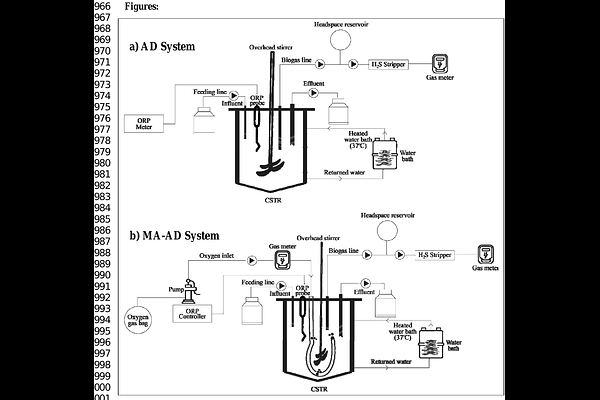Micro-aeration-enhanced Anaerobic Digestion for the Stabilization of Coffee-Processing Wastewater

Micro-aeration-enhanced Anaerobic Digestion for the Stabilization of Coffee-Processing Wastewater
Taiwo, K. J.; Ogundipe, S. O.; Kerr, W. L.; Pegg, R. B.; Suh, J. H.; Usack, J. G.
AbstractCoffee processing wastewater (CPW), a byproduct of agro-industrial operations, contains high organic loads alongside recalcitrant and potentially inhibitory compounds such as caffeine and tannins. This study evaluated the performance of micro-aeration-enhanced anaerobic digestion (MA-AD) for the treatment and valorization of CPW to promote a more sustainable approach to coffee production. Oxygen was intermittently introduced via oxidation-reduction potential-controlled dosing, allowing for comparative assessment across anaerobic and micro-aerobic redox regimes. While both conventional anaerobic digestion (AD) and MA-AD achieved comparable reductions in total and volatile solids (>48% and >60%, respectively) and total and soluble chemical oxygen demand (>66% and >86%, respectively), MA-AD exhibited significantly higher total suspended solids concentrations and turbidity in later phases, likely due to gas sparging-induced floc disruption and particulate release. pH profiles indicated a shift toward increased acidification under MA-AD, without compromising process stability, with both reactors stabilizing between pH 6.8 - 7.1. Caffeine degradation was accelerated under MA-AD in the first dosing phase (>85% removal in 28 h), though long-term degradation efficiency converged with the control. Methane production was consistently lower in MA-AD (up to 43% reduction), attributed to the oxygen sensitivity of methanogens and possible substrate competition. These results underscore the importance of oxygen dose regulation, redox control, and microbial adaptation in optimizing MA-AD performance. The findings support MA-AD as a promising strategy for enhancing hydrolysis and partial removal of recalcitrant compounds in CPW. However, further refinement is required to sustain biogas quality and yield at scale.